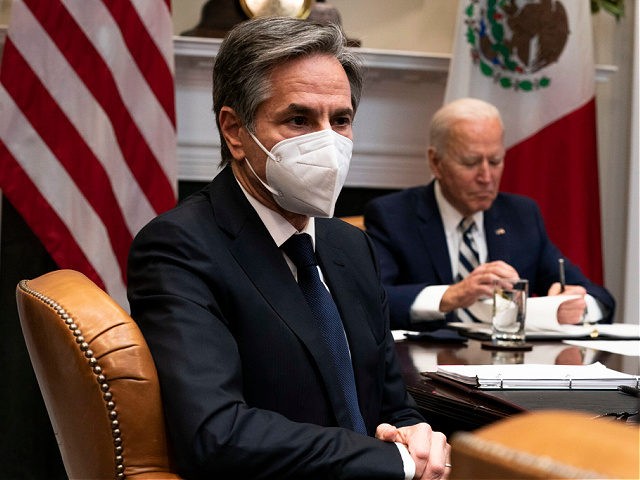WASHINGTON, DC — U.S. Secretary of State Antony Blinken, in his first major foreign policy speech Wednesday highlighting the Biden administration’s goals, promised not to rely on “costly military interventions” to promote democracy, an approach the secretary said has not worked.
Blinken proclaimed:
We will not promote Democracy through costly military interventions or by attempting to overthrow authoritarian regimes by force. We have tried these tactics in the past. However well-intentioned, they haven’t worked. They’ve given democracy promotion a bad name, and they’ve lost the confidence of the American people. We will do things differently.
To support democracy across the globe, Blinken proclaimed that the State Department “will use the power of our example. We will encourage others to make key reforms, overturn bad laws, fight corruption, and stop unjust practices. We will incentivize democratic behavior.”
Biden has vowed to lead with diplomacy to deal with today’s threats, Blinken said, noting that “Americans are rightly wary of prolonged U.S. military interventions abroad.”
The secretary added:
We’ve seen how they’ve often come at far too high a cost, both to us and to others. When we look back at the past decades of our military involvement in the world, especially in Afghanistan and the Middle East, we must remember what we’ve learned about the limits of force to build a durable peace; that the day after a major military intervention is always harder than we imagine; and how critical it is to pursue every possible avenue to a diplomatic solution.
…
Of course, we will never hesitate to use force when American lives and vital interests are at stake. That’s why President Biden authorized an airstrike last week against Iranian-backed militia groups targeting U.S. and coalition forces in Iraq. But in that case – and in future cases when we must take military action – we will do so only when the objectives and mission are clear and achievable, consistent with our values and laws, and with the informed consent of the American people. And we’ll do it together with diplomacy.
The Pentagon cited the U.S. Constitution and United Nations international law as the source for Biden’s legal authority to carry out the recent airstrikes against Iran-backed Shiite militias, including some deemed terrorist groups by the Trump administration.
After promoting diplomacy over military force, Blinken acknowledged that China poses a challenge to the international system, noting that the ties between U.S. and China are the world’s “biggest geopolitical test” of the century.
The Biden administration would “manage” ties with communist China “from a position of strength,” Blinken asserted.
U.S. officials would continue to compete, collaborate, and be “adversarial” with China, if necessary, said the secretary.
Blinken highlighted examples of why he believes promoting peace through military force is a fool’s errand that sounds similar to military action taken during the Obama-Biden administration.
Soon after taking office, Obama escalated the U.S. military presence in Afghanistan, resulting in the highest number of casualties under any president.
Trump attempted to end what he described as the endless wars against terrorism, namely in Iraq and Afghanistan to avail.
Nevertheless, soon before leaving office, he reduced the U.S. military presence in Iraq and Afghanistan to a historically low 2,500 troops in each country.
The Trump administration used a historic airstrike campaign against the Taliban and, to a lesser extent, its top source of funding — labs for making opium into heroin — to help pressure the group to join the peace pact table with the U.S. and the Kabul government.
Biden administration officials say they are reviewing the February 2020 U.S-Taliban deal, which calls for a complete withdrawal of foreign troops by May 1, 2021.
The Biden administration is reportedly considering extending the U.S. military presence beyond May, prolonging America’s longest war.

COMMENTS
Please let us know if you're having issues with commenting.